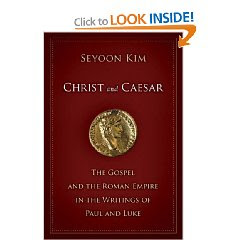
It has become popular in recent years to argue for, and in many cases assume, a strong anti-imperial agenda in the New Testament. From popular teachers like Rob Bell to serious scholars like N.T. Wright (also popular), it's not unusual to see the New Testament interpreted in light of Augstus, Pax Romana, and the imperial cult. Words and phrases like "savior", "son of God" and "gospel"--words the New Testament shares in common with the Roman political world--should, it is argued, be read as an attempt to purposefully subvert the Roman Empire, it's aims, and its authority. One is, of course, from here free to draw all sorts of contemporary political applications.
The New Testament is all about Christ and Caesar, right? Not so fast says Seyoon Kim, a professor of New Testament at Fuller Theological Seminary, who tries to temper the recent enthusiasm for an anti-imperial hermeneutic in his book Christ and Caesar: The Gospel and the Roman Empire in the Writings of Paul and Luke (Eerdmans 2008).
Kim objects to an anti-imperial reading of Paul on several grounds: inappropriate parallelomania, the strong support for imperial authority in Romans 13 and elsewhere, incorrect assumptions about the breadth of the imperial cult, unwarranted proof-texting, the lack of an anti-imperial understanding interpretation in the early church fathers, Paul's confidence before Roman tribunals (why did he always expect to be exonerated if deep down he understood one of his main objectives to be the taking down of the whole empire?), and the dubious appeals to hidden "coding" where an anti-Roman agenda does not seem to be present. Kim summarizes:
Thus, there is no anti-imperial intent to be ascertained in the Pauline Epistles. All attempts to interpret them as containing such an intent, as shown above, are imposing an anti-imperial reading on the epistles based merely on superficial parallelism of terms between Paul's gospel preaching and the Roman imperial ideology, while the texts themselves clearly use those terms to express other concerns. Several attempts have turned out to suffer from grave self-contradiction. Some have betrayed their arbitrariness or desperation by appealing to the device of "coding," that Paul coded his real anti-imperial message in politically innocuous language or in anti-Jewish polemic (68).
Similarly, Luke's writings (his Gospel and The Acts of the Apostles), while aware of the evils of the Roman Empire, are not, strictly speaking anti-imperial. The Lukan message is one where the diaobolical nature of the empire is recognized (because every human system is fraught with evil), but is nevertheless coupled with a willingness to cooperate with the Roman Empire and use its facilities (190). The point, as Kim argues, is that empire is not the main problem in the world of the New Testament. Instead, "The fundamental problem for human beings and the world is the reign of Satan in sin and death (Luke 11:14-23; 13:16; Acts 10:38; 26:18; etc.)" (191).
Even in Revelation, where an anti-imperial agenda is clearly evident, there are still no calls for revolution or plans laid out for this-worldly liberation. The real enemy is Satan and human sinfulness and both are overcome by faith and the witness of the gospel.
However, in spite of his fervent critique of the beastly Roman Empire and his explicit interpretation of Christ's work in the category of the messianic war, the seer John does not envisage the church as actively engaged in political subversion and military campaign. Nor does he show what concrete political changes in the present are entailed in the conversion of the nations to be brought by the Spirit-empowered church's faithful witness to the true God and the Lamb slaughtered. Instead, John prophesies conversion of the nations as constituting the ultimate victory of Jesus Christ and ushering in the consummation of the Kingdom of God, and therefore as something that will take place at the parousia of the Lord Jesus Christ. With this apocalyptic prophecy, John is interested only in assuring the believers of the victory of Jesus Christ and his imminent parousia for the eschatalogical judgment and redemption and calling them to "conquer" (Rev 2:7, 11; 12:11; etc.) the "Beast," the Roman Empire, in the same way that Jesus Christ, the Lamb slaughtered but now enthroned on God's throne, conquered (Rev 5:5): namely, by maintaining faithfully "the testimony of Jesus" unto martyrdom (195).
I couldn't have said it better myself (though I would have said it with smaller words and shorter sentences).










3 comments:
Very interesting stuff, Kevin. More and more I get the sense that certain influential writers bring big ideas to their exegesis, instead of allowing careful, comprehensive, synthesized exegesis to lead to their big ideas. I'm sure the process is cyclical (dialetical?), but as brilliant and creative as certain new perspectives are these days, again and again I worry that they've become too untethered from a careful reading of the Biblical text.
Doug
Not at all a reflection on your "smaller words and shorter sentences" closing line, I thought you might want to spell-check your title and add an "s."
David,
Thanks for the extra "s."
Post a Comment